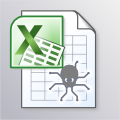Polling vs. Callback
 The Yoctopuce API provides several ways to communicate with Yoctopuce modules: polling, value change callbacks, and periodic callbacks. We mentioned them all from time to time in this blog, but we never took time, until now, to present in details these different techniques. So let's have look :-)
The Yoctopuce API provides several ways to communicate with Yoctopuce modules: polling, value change callbacks, and periodic callbacks. We mentioned them all from time to time in this blog, but we never took time, until now, to present in details these different techniques. So let's have look :-)
| 6 comments | Read more... |
An Excel RTD Server for Yoctopuce sensors
 Almost two years ago, we showed you how to access Yoctopuce devices from Excel by creating your own Excel add-in using Excel-DNA. Today we are going to show something simpler and even better: read any Yoctopuce sensor from Excel, with instant live refresh, without even recompiling a single line of code...
Almost two years ago, we showed you how to access Yoctopuce devices from Excel by creating your own Excel add-in using Excel-DNA. Today we are going to show something simpler and even better: read any Yoctopuce sensor from Excel, with instant live refresh, without even recompiling a single line of code...
| 4 comments | Read more... |
Sending keystrokes from sensor data
![]() The best way to use our devices is to leverage our programming API, available for most programming languages. But there is also a trick to use our sensors to interface existing applications for which you don't have the source code, by emulating keyboard input. If you are building a flight simulator deck or simply try to improve an old-fashioned data entry form interface, this is worth giving a look...
The best way to use our devices is to leverage our programming API, available for most programming languages. But there is also a trick to use our sensors to interface existing applications for which you don't have the source code, by emulating keyboard input. If you are building a flight simulator deck or simply try to improve an old-fashioned data entry form interface, this is worth giving a look...
| No comment yet | Read more... |
Yoctopuce is now available in Maven
 Maven is the most popular build engine for Java. We have therefore modified our Java library to make it compatible with Maven and it is now also available from the Maven Central Repository. Thanks to this, it's now possible to use the Yoctopuce library in a Maven project by adding only three fields in an xml file :-)
Maven is the most popular build engine for Java. We have therefore modified our Java library to make it compatible with Maven and it is now also available from the Maven Central Repository. Thanks to this, it's now possible to use the Yoctopuce library in a Maven project by adding only three fields in an xml file :-)
| No comment yet | Read more... |
Yoctopuce relays and their secrets
![]() Yoctopuce offers a range of relay modules. At first sight, nothing out of the ordinary, you can find tens of USB relays on Internet. But it so happens that the Yoctopuce relays provide a few rare features for this kind of devices. This week, we review some of these advanced features...
Yoctopuce offers a range of relay modules. At first sight, nothing out of the ordinary, you can find tens of USB relays on Internet. But it so happens that the Yoctopuce relays provide a few rare features for this kind of devices. This week, we review some of these advanced features...
| No comment yet | Read more... |


